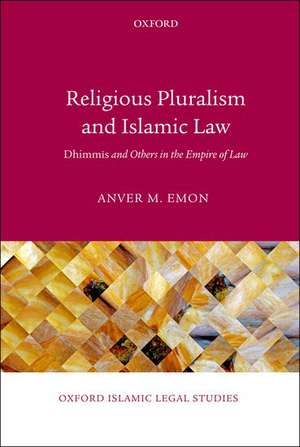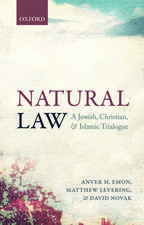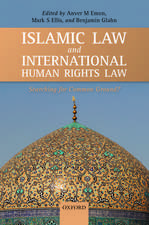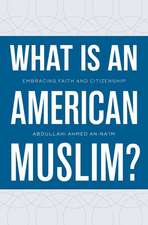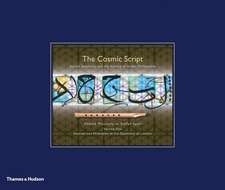Religious Pluralism and Islamic Law: Dhimmis and Others in the Empire of Law: Oxford Islamic Legal Studies
Autor Anver M. Emonen Limba Engleză Hardback – 25 iul 2012
| Toate formatele și edițiile | Preț | Express |
|---|---|---|
| Paperback (1) | 339.29 lei 31-37 zile | |
| OUP OXFORD – 4 sep 2014 | 339.29 lei 31-37 zile | |
| Hardback (1) | 879.91 lei 31-37 zile | |
| OUP OXFORD – 25 iul 2012 | 879.91 lei 31-37 zile |
Preț: 879.91 lei
Preț vechi: 1199.96 lei
-27% Nou
Puncte Express: 1320
Preț estimativ în valută:
168.42€ • 183.01$ • 141.57£
168.42€ • 183.01$ • 141.57£
Carte tipărită la comandă
Livrare economică 09-15 aprilie
Preluare comenzi: 021 569.72.76
Specificații
ISBN-13: 9780199661633
ISBN-10: 0199661634
Pagini: 382
Dimensiuni: 163 x 241 x 29 mm
Greutate: 0.73 kg
Editura: OUP OXFORD
Colecția OUP Oxford
Seria Oxford Islamic Legal Studies
Locul publicării:Oxford, United Kingdom
ISBN-10: 0199661634
Pagini: 382
Dimensiuni: 163 x 241 x 29 mm
Greutate: 0.73 kg
Editura: OUP OXFORD
Colecția OUP Oxford
Seria Oxford Islamic Legal Studies
Locul publicării:Oxford, United Kingdom
Recenzii
Polytheists and the irreligious were anathematized in classical Islam, but it assigned People of the Book, mainly Christians and Jews, to an intermediate protected category, the dhimma. Much writing on this institution takes sides, arguing that it was a mechanism either for interreligious harmony or for persecution of minorities. Anver Emon, in his weighty and original Religious Pluralism and Islamic Law, rejects both opposing views, as well as the concept of tolerance as a useful analytical tool.
Notă biografică
Anver M. Emon is Associate Professor of Law at the University of Toronto's Faculty of Law. Emon's research focuses on premodern and modern Islamic legal history and theory; premodern modes of governance and adjudication; and the role of Shari'a both inside and outside the Muslim world. The author of Islamic Natural Law Theories (OUP, 2010), Professor Emon is the founding editor of Middle East Law and Governance: An Interdisciplinary Journal, and one of the general editors of the Oxford Islamic Legal Studies series.
